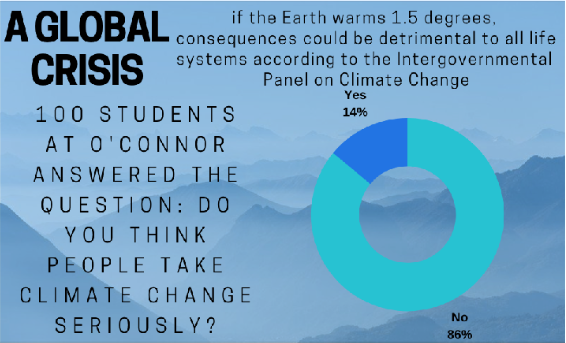Sytha Beth Ortiz
News Editor
Hoax. Expensive tax. Bulls–t. All words President Donald Trump has used to address climate change in our country. On October 11th, in an interview with 60 Minutes reporter Lesley Stahl, Trump admitted to “something happening” although he’s not convinced it’s caused by human activity. When challenged with scientific fact researched by the National Oceanic and Atmospheric Administration and NASA, Trump claimed scientists “have a very big political agenda.” Trump and many Americans view climate change as a hoax.
“People often refuse to believe that phenomena such as climate change isn’t happening since they are insulated from the effects of climate change. Many Americans are rooted in a fixed mindset due to their insulation from the impacts of global warming, pollution or similar malady. ‘If it’s not directly impacting me, then is it really as bad as they portray it in the media?’ When you only see images or documentary footage of the adverse climate effects, you can easily dismiss them as edited or manufactured, rather than a true reflection of reality,” AP Environmental Science teacher Melissa Michalak said.
Climate change is not yet severe enough to directly impact the daily lives of people making it easy to overlook.
“Second, many people now have poorly developed sense of science and critical thinking skills, leading to an undeveloped ability to evaluate competing theories and information. They then pick the version of reality that conforms to their chosen political affiliation or is easiest to rationalize as they go about their day. Given the sheer amount of information (and disinformation) available, it’s no wonder many people in developed nations remain skeptical of global warming,” Michalak said.
The effects of climate change negatively impact all life on Earth.
“The future generations are definitely the most vulnerable to climate change because it will take time to take effect,” senior Ariana Tamez said.
Climate change does not have an immediate, visible effect on the environment which generally causes people to overlook the consequences of their actions. “When people don’t believe they impact climate change, they rarely adjust their patterns in a way to minimize their global footprint. A person won’t recycle, drive a more fuel-efficient vehicle (or alter driving habits), reduce trash or general consumption of goods, simply because they do not believe the impact he or she makes alters anything. They assume if I’m not negatively affected, then what’s the harm,” Michalak said.
Freshman Iliana Hernandez mentioned her concern for the wildlife losing their homes due to the melting of glaciers. “The polar bears can’t live. They can’t find anywhere to live. And it’s because humans are like ‘pollution, pollution, fossil fuels, fossil fuels’,” Hernandez said.
Hernandez shared that humans have the largest impact on climate change and holds humans responsible for the harm done to the environment.
“People who can’t (or won’t) consider the larger implications of their actions, and they won’t expect their leaders, businesses or neighbors to take up the slack for them so they support political representatives that don’t take any meaningful action to stem global warming, or actively pursue policies that exacerbate the problem for short-term economic or political gains among supporters or like-minded individuals,” Michalak said.
The erratic temperatures are a cause for concern because of the effects it will have on ecosystems throughout the world.
“It matters because it affects the availability of the resources our society needs to function,” Tamez said.
The Intergovernmental Panel on Climate Change have researched indicators such as temperatures during the night and day, sea levels, aquatic life, ecosystems, human health, and population measurements to determine the effects of global warming on our current environment. Recently, they released a report stating that if the Earth warms 1.5 degrees Celsius, consequences could be detrimental to all life systems.
Warm spell duration indicators, defined by NASA, is the annual count of at least six consecutive days with temperatures that exceed the 90th percentile of daily maximum temperature, show that there will be “extreme” hot and cold temperatures on land as well as in the sea. Hot temperatures will affect Central and Eastern America, leading to drier and warmer temperatures, not ideal for the breadbasket of America. Storms will also increase in strength. Warmer temperatures lead to warmer waters which fuels storms like hurricanes.
“Our current president is on record saying climate change/global warming is a Chinese-perpetrated hoax meant to “screw the US.” His actions since taking office, such as extricating the US from the Paris Climate Accords, hiring pro-business Cabinet members, and freezing or lowering EPA standards for gas mileage, pollution (and pollution enforcement) and other policies prove that this administration puts corporations and corporate profits above human and environmental health,” Michalak said.
Organizations and agreements such as the Paris Climate Accords and the Environmental Protection Agency are formed to conserve and improve the environment. The Paris Agreement’s goal is to gather countries in a combined effort to slow the rate of climate change and assist developing countries with the necessary supplies. Withdrawing from the agreement only increased the finances needed to work towards the countries’ goal which increases the difficulty of implementing change.
“Return to the Paris Climate Accord. Reinstate much of the regulations present in the Clean Air and Water Acts that have been gutted since the early 2000’s and support climate science on the national and international level. Raise gas mileage standards and provide subsidies for electric cars, solar panels, wind power (both for residences and communities) and move away from fossil fuels (coal and oil),” Michalak said.
With new innovations and technology arising, there are plenty of ways to reduce and avoid increasing the amount of pollutants entering Earth’s atmosphere and causing global warming.
“America should be a beacon and leader in their realms, but steadfastly refuses to move on much of these ideas. Giving the next generation the knowledge and ability to make change is the key to limiting and possibly reversing the deleterious impacts of climate change and global warming,” Michalak said.

